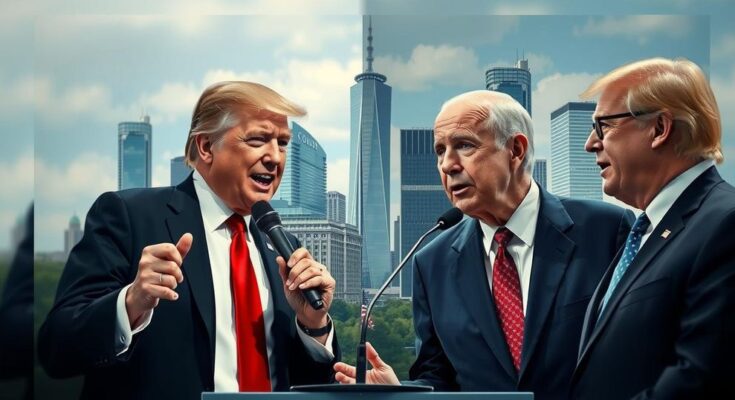The contrasting economic policies of Donald Trump and Kamala Harris are at the forefront of the 2024 presidential campaign. Trump promises to drive down prices and cement tax cuts, while Harris aims to create an equitable economy with support for workers and small businesses. Voter confidence leans towards Trump, though economists express concerns about both candidates’ proposals.
Economic concerns are dominating discussions on the 2024 presidential campaign trail, with a substantial number of voters prioritizing this issue. The Pew Research Center reveals that a staggering eight out of ten voters consider the economy crucial in choosing the next president. As candidates, former President Donald Trump and Vice President Kamala Harris emphasize their distinct economic visions during their rallies. During a rally in Asheville, North Carolina, Trump vowed, “The day I take the oath of office, we will rapidly drive prices down and make America affordable again.” His 2024 economic platform promises to tackle inflation swiftly, solidify tax cuts, enhance American energy production, reduce government spending, impose tariffs on imports, and curb illegal immigration. In stark contrast, Vice President Harris envisions building an “opportunity economy” that ensures equitable chances for all Americans. Her strategy focuses on lowering taxes for working people, minimizing the cost of essential goods and healthcare, cracking down on fraud, implementing bans on price gouging, and boosting innovation to promote small business growth. She stated, “I believe we have an extraordinary opportunity to make our middle class the engine of America’s prosperity.” The Pew survey reflected a noteworthy confidence gap; 55% of voters trust Trump more on economic matters, compared to 45% for Harris. Yet, concerns arise from mainstream economists regarding Trump’s proposals. University of Chicago economist Steven Durlauf commented on the increased risks associated with Trump’s plans, particularly pointing out the ambitious tariffs and intentions to undermine Federal Reserve independence. Conversely, he noted some economists’ apprehension towards Harris’s proposals, including price gouging regulations.
As the 2024 election season heats up, the economy remains a pivotal topic for American voters. The promise of a strong economy resonates deeply, influencing public perception and candidate support. Both Trump and Harris are strategically outlining their economic plans, aiming to appeal to citizens concerned about financial stability amidst fluctuating market conditions.
The economic strategies of Trump and Harris clearly diverge, reflecting their unique approaches to navigating national financial challenges. While Trump emphasizes immediate measures to reduce prices and support American energy, Harris advocates for inclusive growth targeting the middle class. The contrasting perceptions of their economic competence, as indicated by voter confidence, underscore the importance of economic policy in the upcoming election.
Original Source: www.kmvt.com



